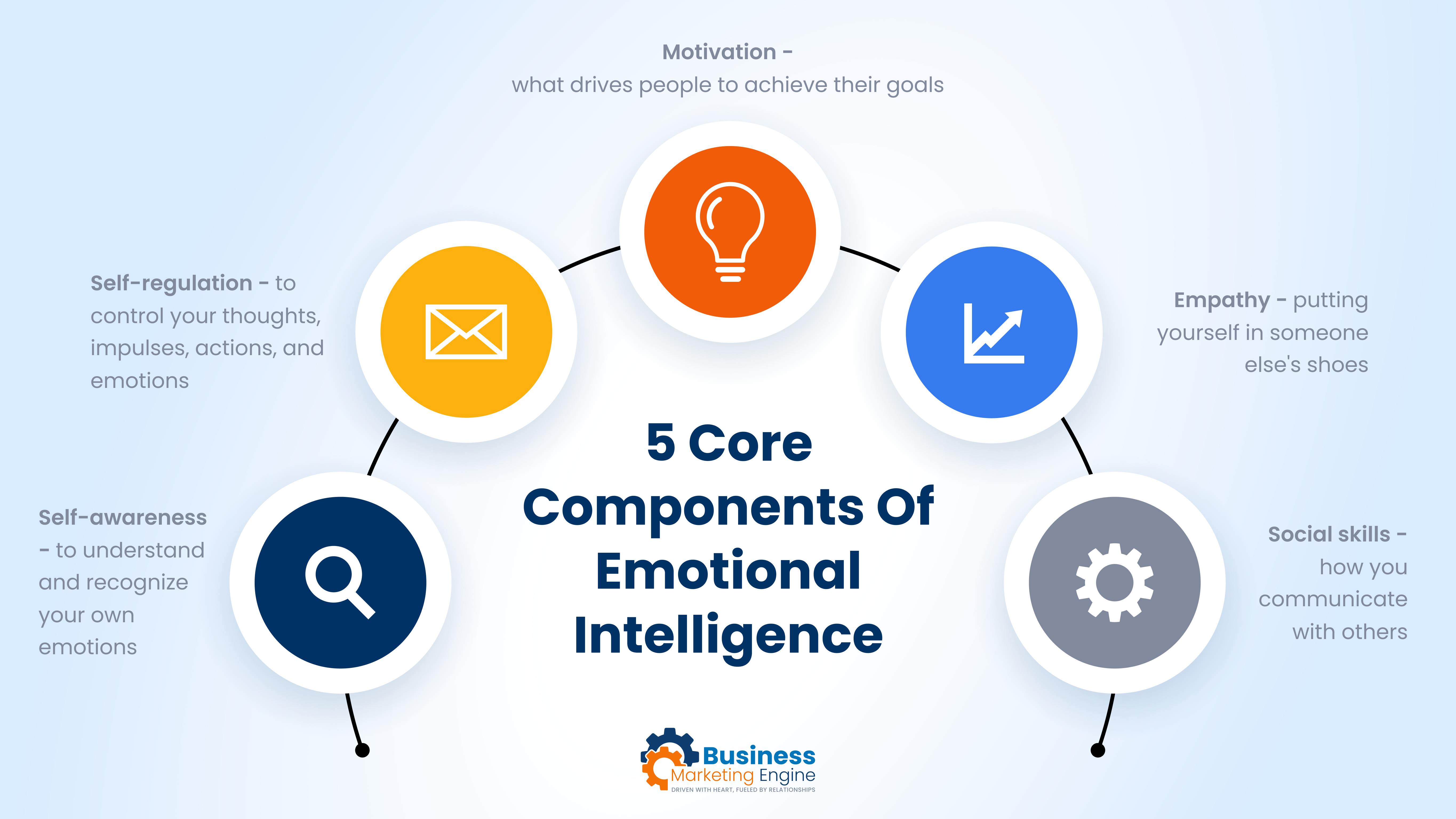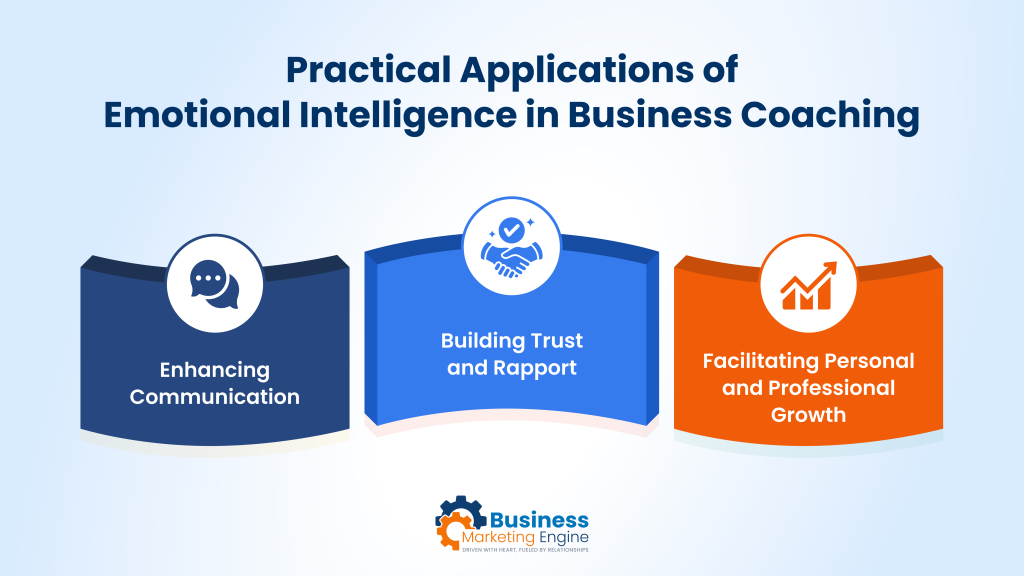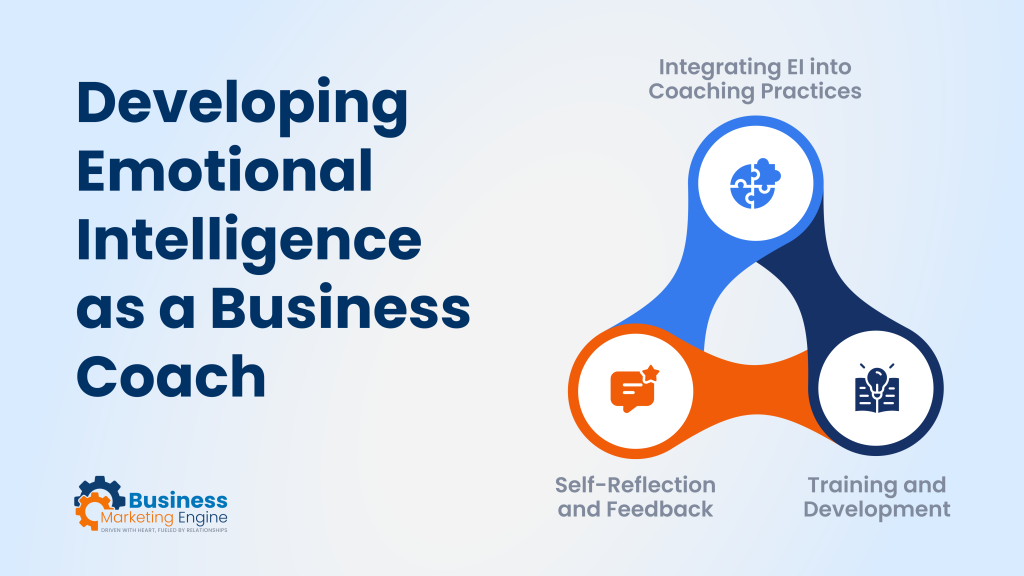Emotional intelligence (EI) has become key to providing business coaches with the tools they need to effectively help their clients.
No more relying on what you know.
In order to succeed in business coaching you need to change your strategy to learn how to understand emotions – both yours and your clients.
Take it from Harvard University,
“The core of high EI is self-awareness: if you don’t understand your own motivations and behaviors, it’s nearly impossible to develop an understanding of others.”
Ready to learn how you can utilize emotional intelligence to create more effective business coaching?
Read on for important tips, tools and applications for incorporating EI into your business coaching and mentoring practice.
Understanding Emotional Intelligence in the Context of Business Coaching
Now, how exactly does emotional intelligence benefit business coaches?
Definition of Emotional Intelligence
Emotional intelligence has 5 core components:
- Self-awareness – to understand and recognize your own emotions
- Self-regulation – to control your thoughts, impulses, actions, and emotions
- Motivation – what drives people to achieve their goals
- Empathy – putting yourself in someone else’s shoes
- Social skills – how you communicate with others
Your professional business coaching will grow once you understand how to implement these skills into your everyday routine.
Now, you may be wondering if emotional intelligence (EI) is the same as general intelligence (IQ) – They’re not.
While IQ measures cognitive abilities, EI focuses on how to understand and manage emotions.
Without emotional intelligence, business coaches would not be able to:
- Strength their relationships with their clients
- Understand and navigate daily conflicts
- Communicate their ideas and teachings
- Foster a positive work environment making people want to come back for more
This stands true for professionals who specialize in small business coaching, professional business coaching, and executive business coaching.
Why Emotional Intelligence Matters in Coaching
You want to always offer effective business coaching services.
If you don’t master your own emotions, how do you expect to help your clients master theirs?
By taking charge of your emotions, you are able to strengthen your coaching partnership through enriched communication and deepened trust.
Key Components of Emotional Intelligence in Coaching
Let’s break down all of the components successful business coaches use to increase their emotional intelligence.
Self-Awareness
Have you ever noticed you’re drawn to something just because?
Want to know why?
Underlying bias, everyone has it.
This is when you favor certain things over others.
It’s totally natural, and everyone does it, but it’s important to note: Business coaches must be aware of their own biases and emotions when working with clients.
This can be done by understanding your thoughts and what drives them.
By analyzing what drives your emotions, you are able to better understand your clients’ perspectives.
Self-Regulation
Managing emotions can be hard.
And it, unfortunately, can’t be learned and mastered overnight.
However, by practicing self-regulation, business coaches can better control their emotions and reactions in various situations.
This means being able to take a step back and assess the situation before responding emotionally.
It also involves recognizing when your emotions may be clouding your judgment.
Pro Tip: If you’re an online business coach or your sessions are recorded, listen back and reflect on your reactions.
By continuously practicing self-regulation, you can create a more positive and productive coaching environment for both yourself and your clients.
Empathy
Let me ask you – are you able to put yourself in someone else’s shoes?
To succeed in business coaching, you should be able to understand your clients’ feelings and motivations.
Start by listening to what your clients have to say and understand how that would make you feel.
When people feel heard, they respond better to instructions and relationships.
Social Skills
This is where interpersonal skills come into play.
In business coaching, developing these skills is essential to create a strong relationship with your clients.
Business coaches are not just advisors—they’re trusted guides, and they help their clients transform into the person they were always meant to be.
Techniques to nurture this relationship with clients include:
- Building rapport:
- Coaches should actively listen, ask open-ended questions, and show empathy to create a safe and trusting space.
- Managing conflicts:
- Stay neutral, and facilitate solution-focused conversations.
- Guiding clients through change:
- This involves clarifying the purpose behind the change
- Break the goal down into actionable steps
- Offer continuous support
- Celebrate progress to maintain motivation
- This involves clarifying the purpose behind the change
Motivation
The final component of mastering emotional intelligence is to be able to understand the role of intrinsic motivation.
This is to be able to do something out of passion and drive rather than consequence.
When you offer professional business coaching, you need to understand why your client came to you.
What drives them to continue working harder?
As a business coach, help your clients tap into their own internal drive and personal values, creating sustained change.
Pro Tip: The best way to inspire clients to achieve their own personal goals is by modeling passion and commitment.
Practical Applications of Emotional Intelligence in Business Coaching
Ever wonder how emotional intelligence relates to the world of business?
Enhancing Communication
Let’s say a client is super frustrated. How would a business coach go about fixing the situation?
They would acknowledge the client’s hardships and then reframe them into a positive situation.
The coach listened, understood, and then acted on the issue to provide better support for the client.
Building Trust and Rapport
When someone signs up for business coaching, it’s important to understand you will become your client’s foundation for building success.
Fostering trust and rapport is the root of creating a healthy relationship.
Coaches can do this by recognizing and responding to clients’ emotions with empathy, ensuring they feel understood and valued.
When a business coach has a high level of emotional intelligence, it gives them the ability to create a safe and supportive environment for clients.
Facilitating Personal and Professional Growth
Have you ever noticed that people naturally have emotional barriers?
As a coach, you can use emotional intelligence to address these barriers to ensure your clients’ success.
Work on reframing your clients’ negative thoughts, and provide support for overcoming their obstacles to achieve their goals.
Developing Emotional Intelligence as a Business Coach
Let’s break down the best ways a business coach can begin their journey to emotional intelligence.
Self-Reflection and Feedback
The first step to strengthening your emotional intelligence is to seek regular feedback and practice self-reflection.
You want to be able to identify the areas you need to grow and improve.
Tools like journaling and mindfulness practices can provide valuable insights.
Participating in peer or client feedback sessions can support continual improvement.
Training and Development
A great way for people to develop their emotional intelligence is by seeking training programs and resources designed to enhance their skills.
This continuous development fosters more effective, adaptable coaching, leading to long-term success for both business coaches and clients.
Integrating EI into Coaching Practices
Try to implement emotional intelligence into your everyday routine.
You can start by reflecting on your emotional responses and then adapt to clients’ needs.
Some strategies for embedding EI into your daily business coaching practices include: v
- Practice active listening with every one
- Do emotional check-ins daily
- Create questions to build trust and understanding with clients
- Practice self-regulation and emotional awareness in the workforce
- Create a safe and supportive environment for all
Conclusion
Emotional intelligence is not just a supplementary skill for business coaches – it’s a fundamental one.
It allows you to understand yourself and the people around you.
Effective business coaching extends beyond cognitive abilities and focuses on delivering impactful meaningful results.
How much emotional intelligence do you think you have?
Consider incorporating EI development into your professional growth plan to enhance your coaching effectiveness.
Need support with strengthening your coaching business? We have experienced coaching experts on standby, ready to answer your questions and provide guidance- no strings attached.






